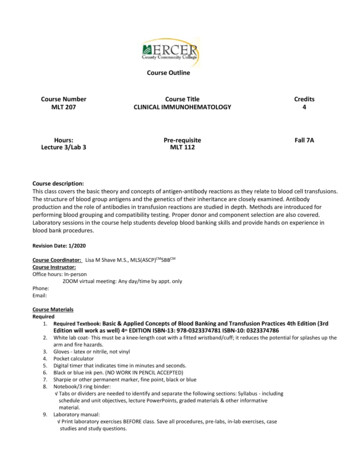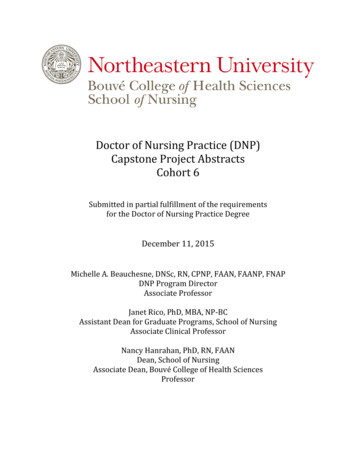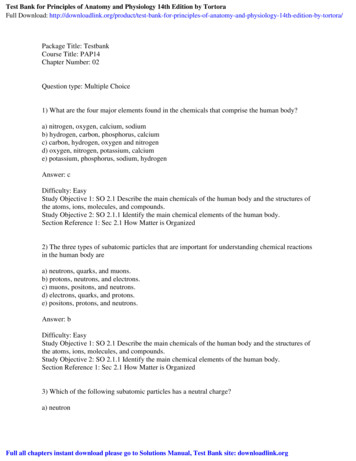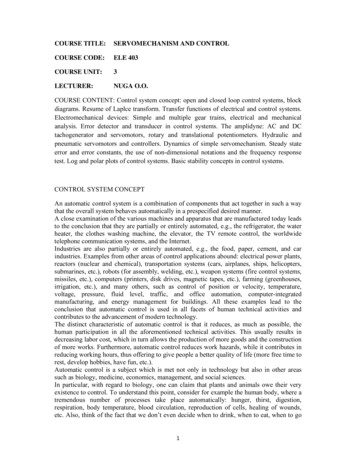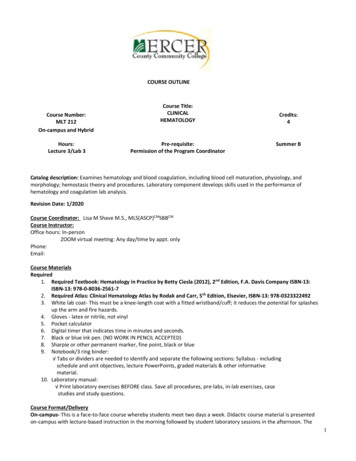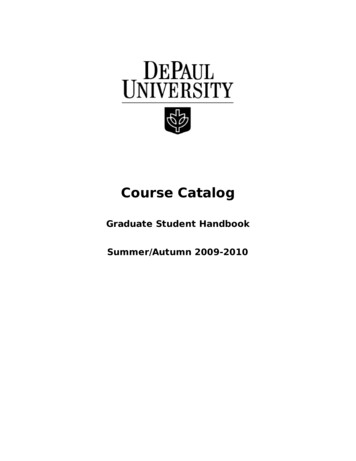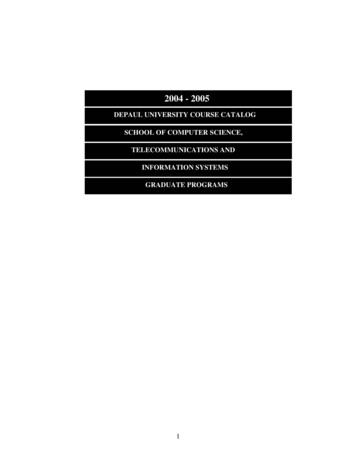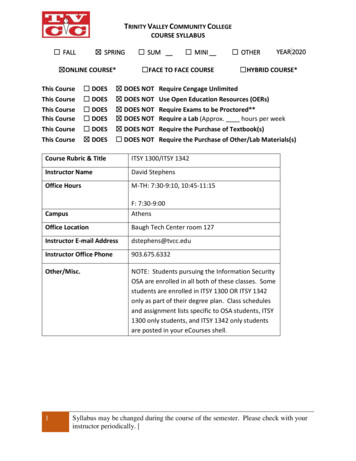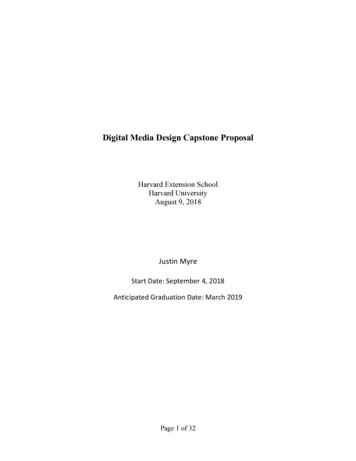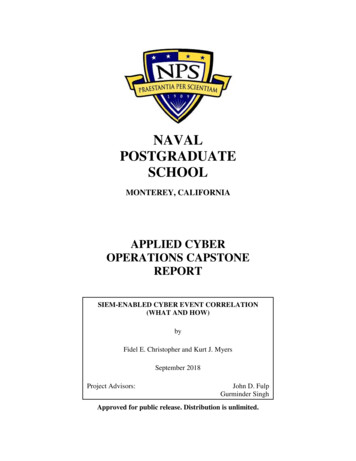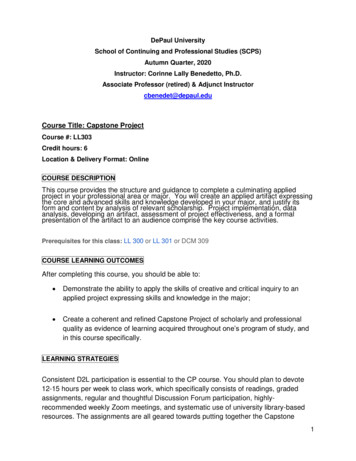
Transcription
DePaul UniversitySchool of Continuing and Professional Studies (SCPS)Autumn Quarter, 2020Instructor: Corinne Lally Benedetto, Ph.D.Associate Professor (retired) & Adjunct Instructorcbenedet@depaul.eduCourse Title: Capstone ProjectCourse #: LL303Credit hours: 6Location & Delivery Format: OnlineCOURSE DESCRIPTIONThis course provides the structure and guidance to complete a culminating appliedproject in your professional area or major. You will create an applied artifact expressingthe core and advanced skills and knowledge developed in your major, and justify itsform and content by analysis of relevant scholarship. Project implementation, dataanalysis, developing an artifact, assessment of project effectiveness, and a formalpresentation of the artifact to an audience comprise the key course activities.Prerequisites for this class: LL 300 or LL 301 or DCM 309COURSE LEARNING OUTCOMESAfter completing this course, you should be able to: Demonstrate the ability to apply the skills of creative and critical inquiry to anapplied project expressing skills and knowledge in the major; Create a coherent and refined Capstone Project of scholarly and professionalquality as evidence of learning acquired throughout one’s program of study, andin this course specifically.LEARNING STRATEGIESConsistent D2L participation is essential to the CP course. You should plan to devote12-15 hours per week to class work, which specifically consists of readings, gradedassignments, regular and thoughtful Discussion Forum participation, highlyrecommended weekly Zoom meetings, and systematic use of university library-basedresources. The assignments are all geared towards putting together the Capstone1
Project gradually (i.e., throughout the quarter) and in a scaffolding model (i.e., eachassignment builds on the ones that precede it).LEARNING RESOURCESThere is no required textbook for this course. Online modules and the DePaulUniversity Library together contain the pertinent and necessary resources.As your instructor, I urge each of you to read good writing for at least one houreach day and to spend at least that amount of time writing—whether it is for thisclass or for your own practice and use.LEARNING ACTIVITIES AND ASSESSMENTThis course uses the following learning approaches: Weekly discussion forums that focus on topics relevant to the ten modules of thecourse.Weekly assignments (submissions) that scaffold towards the development of theCapstone Project.A class presentation of the form, purpose, and content of your Capstone Project.To complete the course, students must fulfill each of the assignments as described inthe course and submit them to the instructor by the assigned deadline in D2L’s coursesubmission area. In addition, students must participate in the course discussion forumsby responding to all discussion instructions and by interacting with fellow classmates, asrequired.SCPS Minimum Grade PolicySCPS degree programs with majors (BAPSBA, BAPSC, BAHA, BADA, BANM, andBALS) require a grade of C- or better in courses taken at DePaul or transfer workapplied to course requirements in the Major and in the LL 261: Essay Writing course, inthe College Core. All other course requirements in these programs can be completedwith a grade of D or better. SCPS degree completion major programs (BAABS andBALS) require a C- or better in all courses taken at DePaul applied to those programs.SCPS competence-based programs (BAIFA, BAC, BAGB and BAECE) require a D orbetter in courses taken at DePaul or transfer work applied to competence requirements .Pass/Fail Grade PolicyStudents interested in taking the course on a Pass/Fail grade basis need to contact theiracademic advisor to request the option by the end of the second week of the course. SCPS2
students can email their requests to their advisors and include the course number, quarter, andstudent ID number. Non-SCPS students need to contact their home college for instructions onsubmitting these requests. Please review the P/F guidelines, course restrictions and GPAimplications in the University catalog before making your request. A grade of Pass represents aD or better standard and therefore will not meet requirements that have a minimum standard ofC- or better. For further clarification of the P/F option for SCPS students beyond the universityguidelines, please refer to the SCPS catalog.Late Work PolicyA grade reduction is applied to late work (unless excused from the deadline by instructorfor medical or major personal reasons.Incomplete (IN) GradeThis process follows university policy.A student who encounters an unusual or unforeseeable circumstance that preventsher/him from completing the course requirements by the end of the term, may request atime extension to complete the work. The student must formally initiate the request by submitting the Contract forIssuance of Incomplete Grade form (via email, word doc), no later than week 10 (orprior to the final week of a shorter-term course). The instructor has discretion to approve or not approve the student’s request for anIN grade. The instructor has discretion to set the deadline for completion of the work, whichmay be earlier but no later than two quarters (not counting summer term). The instructor may not enter an IN grade on behalf of a student without acompleted and agreed upon contract. The student is alerted that IN grades are not considered by Financial Aid asevidence of satisfactory academic progress.Course Grading ScaleGradePercentageA100-93%A-92-90%B to B-89-80%VerbalDescriptorExcellentVery Good3
C to C-79-69%SatisfactoryD to D-68-60%PoorF 60%UnacceptableDePaul University Rubric for Letter GradesThe instructor judged the student to have accomplished the stated objectives ofthe course in an excellent manner.AThe instructor judged the student to have accomplished the stated objectives ofthe course in a very good manner.BThe instructor judged the student to have accomplished the stated objectives ofthe course in a satisfactory manner.CThe instructor judged the student to have accomplished the stated objectives ofthe course in an insufficient manner.DF The instructor judged the student not to have accomplished the stated objectivesof the course.Summary of Assignments: Percentages, Point Values, and Weeks DueAssignments:% of Final Point Value Week DueGradeDiscussion Forums10%10Weekly1.2 Essay5%5Week 12.2 Essay5%5Week 23.2 Essay5%5Week 34.2 Research Planning Worksheet5%5Week 45.2 Annotations10%10Week 54
6.2 Essay5%5Week 67.2 Purpose Statement5%5Week 710Week 85%5Week 910.2 Capstone Artifact w/Narrative25%25Week 1011.2 Oral Presentation10%10Week 118.2 Review Literature Essay10%9.2 Final Artifact Structure EssayTotal100%100 Points5
CAPSTONE PROJECT ASSESSMENT RUBRICLearning l orprofessionalexperience, andinterest in aparticularproblem or issue.InquiryDemonstratesunderstanding ofthe broadercontext of aparticularproblem or issue.DecisionMakingContextualizespersonal orprofessionalexperiencewithin theparticularproblem orissue.Relatespersonal orprofessionalexperience tothe particularproblem orissue.Explainspersonal orprofessionalexperience andinterest in ageneralproblem orissue.Identifiespersonal orprofessionalexperience,andsummarizes ageneralproblem orissue.No discussionof personal orprofessionalexperience.No evidence ofdiscussion of aproblem orissue.Synthesizeswhat othershave said ordone about aparticularproblem orissue, andaccessesrelevant/relatedresources orliterature.Analyzes thecontext ofwhat othershave said ordone about aparticularproblem orissue, andaccessesrelevant/related resources orliterature.Summarizeswhat othershave said ordone about aparticularproblem orissue, andaccessesrelevant/relatedresources orliterature.Describes thebroadercontext of aparticularproblem orissue, but noevidence ofaccess torelevant/relatedresources orliterature.No evidence ofunderstandingof the broadercontext of aparticularproblem orissue, noraccess torelevant/relatedresources orliterature.Chooses andsummarizesrelevant directinvestigation,hands ysis toaddress theproblem orissueindependently.Choosesrelevant cation, orsecondaryanalysis toindependentlyaddress theproblem/issue/theory.Chooses cation, orsecondaryanalysis toaddress theproblem orissueindependently,but the methodis not relevant.No evidence ofa relevant directinvestigation,experience,application, orsecondaryanalysis toaddress theproblem orissueindependently.Chooses andexplainsrelevant directDemonstrates useinvestigation,of oryexperience,application,application ofand/ortheories orsecondarysecondaryanalysis toanalysis toaddress theaddress theproblem orproblem or issueissueindependently,independently.and shows howthis methodJustifiesconnects to theconnectionslarger theoretical with the largerframework andtheoreticalstandards in theframework.field.Establishes aconnection tothe largertheoreticalframework.Does notexplain aconnection tolargertheoreticalframework.Does notexplain orconnect tolargertheoreticalframework.6
,organization, andacademicstandards in finaldocumentation ofthe CapstoneProjectOrganizeslogically aclear, effectivepresentation ofthe CapstoneProject’s finaldocumentation,according tothe purposeand audienceof the project.Consistentlyuses relevantformat andcitation styleand includessupportingmaterials,whennecessary.Contains noobvious errors(grammar,fluency, etc.).SelfAssessmentReflects on thelearning processand competencygained throughcompletingCapstoneProject.Evaluates howthe projectachieved itsintendedpurpose, how itwas executed,and how itcontributes tothe field.Appraises thecharacteristicsof the learningprocess, andexaminesimplications forfuture learning.Organizes withcoherence andclarity, andappropriatelypresents finaldocumentationof theCapstoneProject for therelevantpurpose tandards(format,citation,supplements).Containssome minorerrors(grammar,fluency, etc.).Analyzes howthe projectachieved itsintendedpurpose, howit wasexecuted, andhow itcontributes tothe field.Assesses thelearningprocess, andrelates toideas forfuture.Organizes withcoherence andclarity, andpresents finaldocumentationof theCapstoneProject for therelevantpurpose andaudience.Does citation,supplements).Containsseveral errors(grammar,fluency, etc.).Presents finaldocumentationof theCapstoneProject for therelevantpurpose andaudience.Lacksorganization,coherence, andclarity,Finaldocumentationof the CapstoneProject isincomplete andnot effectivelypresented forthe relevantpurpose andaudience.Does not useappropriateacademicstandards(format, citationstyle,supplements,etc.).Contains manyerrors thatmakeunderstandingdifficult.Describes howthe projectachieved itsintendedpurpose, how itwas executed,and how itcontributes tothe field.Summarizeshow the projectachieved itsintendedpurpose, how itwas executed,or how itcontributes tothe field.Summarizesthe learningprocess, andidentifies ideasfor future.Identifieslearningoutcomesand/or plans.No evidence ofreflection onlearning orplans for futurelearning.7
ASSESSMENT RUBRIC FOR DISCUSSION FORUMThe instructor expects that students will contribute to discussions each week. For onlinediscussions, the instructor uses the rubric described below (modeled after Pelz, 2004). Pleasetake this into consideration as you prepare and participate in class discussions.Level InterpretationCharacter of the Contribution4ExcellentThe comment is 1) accurate, 2) original, 3) relevant, 4) teaches us something,and 5) is well written (where posted online). Four-point comments addsubstantial teaching presence to a course and stimulate additional thoughtabout the issue under discussion. Likewise, a response to another student'spostings should also have these qualities.3AboveAverageThe comment lacks at least one of the five above qualities, but is aboveaverage in quality. A level 3 comment makes a significant contribution to ourunderstanding of the issue being discussed.2AverageThe comment lacks two or three of the required qualities. Comments that arebased on personal opinion or experience are often within this category.1MinimalThe comment presents little or no new information. However, level 1 commentmay provide important social presence and contribute to a collegialatmosphere.0UnacceptableThe comment adds no value to the discussion.COURSE STRUCTUREThis course consists of 11 modules, each of which takes one week to complete, as indicated inthe course schedule below. Due dates are provided in the online course calendar. This courseis not a self-study course, but a paced course, and it is important that you keep up with thecourse activities, contribute to the online course discussions, and participate as possible in theweekly Zoom meetings.COURSE SCHEDULEWeek, Module #, and TitleWeek 1, Module One:- DefinitionsReadingsAll courseresources areavailable in D2L– please refer tothe Modules.Discussion/Submissions1.1 Introduce Yourself to Your Classmates(Discussion)1.2 Assessing Skills and Knowledge inMajor (Essay)1.3 Optional Virtual MeetingWeek 2, Module Two:-Scope and PurposeAll courseresources are2.1 Possibilities (Discussion)8
Week 3, Module Three:-Artifact Form/Structureavailable in D2L– please refer tothe Modules.2.2 Exploring Applications (Essay)All courseresources areavailable in D2L– please refer tothe Modules.3.1 Thinking about Form (Discussion)2.3 Optional Virtual Meeting3.2 Selecting Optimal Form and Content(Essay)3.3. Optional Virtual MeetingWeek 4, Module Four:-Library ResearchWeek 5, Module Five:-References and GuidelinesWeek 6, Module Six:-Final Structure/FormWeek 7, Module Seven:-Use ValueWeek 8, Module Eight:-Reviewing RelevantLiteratureAll courseresources areavailable in D2L– please refer tothe Modules.4.1 Research DiscussionAll courseresources areavailable in D2L– please refer tothe Modules.5.1 Finding SourcesAll courseresources areavailable in D2L– please refer tothe Modules.6.1 Structure & Application (Discussion)All courseresources areavailable in D2L– please refer tothe Modules.7.1 Implementation DiscussionAll courseresources areavailable in D2L– please refer tothe Modules.8.1 Patterns in Resource MaterialDiscussion4.2 Research Planning Worksheet4.3 Optional Virtual Meeting5.2 Annotations5.3 Optional Virtual Meeting.6.2 Justifying Form Essay6.3 Optional Virtual Meeting7.2 Purpose Statement Essay7.3 Optional Virtual Meeting8.2 Review of the Literature Essay8.3 Optional Virtual MeetingWeek 9, Module Nine:All course9.1 Checking In: A Talking Circle and a9
Week 10, Module Ten:- Final Projectresources areavailable in D2L– please refer tothe Modules.Self-Assessment(Discussion)All courseresources areavailable in D2L– please refer tothe Modules.10.1 Decision-making DiscussionWeek 11: Module Eleven-Presenting Your Work9.2 Class Presentation of the CapstoneProject and Review of Classmates(Submission / Discussion)10.2 Capstone Project (Final)11.1 Oral Presentation via ZoomThis course includes and adheres to the college and the university policies described in thelinks below:APA citation format (GRAD)Academic Integrity Policy (GRAD)Academic Integrity Policy (UGRAD)Incomplete (IN) and Research (R) Grades Expiration PolicyWithdrawal/Drop Policy and Withdrawal TuitionAccommodations Based on the Impact of a DisabilityProtection of Human Research ParticipantsOther Resources for StudentsUniversity Center for Writing-based LearningDean of Students OfficeAdditional ConsiderationsRecording of Classroom Sessions Conducted via Videoconference tools: Synchronous teaching sessions can be recorded by the instructor for educationalpurposes. These recordings will be made available only to students presently enrolled in10
the course via password protected links. Links will be posted via the course webpageson D2L and viable for the present term only.Students are prohibited from sharing class recordings or disclosing the links to a classsession to anyone outside of the course.Students have the right to protect their privacy during recordings by appearing in anaudio-only mode; pseudonymous usernames can be used by students, if shared offlinewith the instructor.Instructors may retain portions of the recordings that contain their intellectual propertyconsistent with University policy, with students’ identifying information removed.11
BALS) require a grade of C- or better in courses taken at DePaul or transfer work applied to course requirements in the Major and in the LL 261: Essay Writing course, in the College Core. All other course requirements in these programs can be completed with a grade of D or
